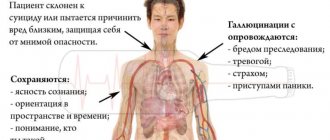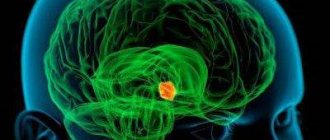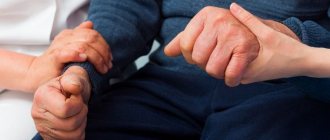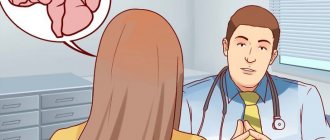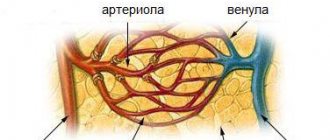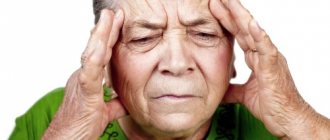One of the severe degenerative diseases that affects the human brain, leading to mental dementia (dementia) is Alzheimer's disease. Women are more often affected; the pathology in most cases develops in older people. Brain damage is accompanied by memory loss, impaired thinking, orientation and coordination. The last stage of Alzheimer's disease is characterized by personality degradation, complete loss of memory, speech, body functions are lost, and death is possible.
Modern diagnostic equipment at the Yusupov Hospital, and the experience of specialists treating Alzheimer's disease, make it possible to diagnose the disease in a timely manner.
How long do they live with adequate treatment for Alzheimer's disease?
Alzheimer's disease comes in senile and presenile forms. The senile (senile) form of the disease occurs in people over 65 years of age, progresses slowly, the patient can live up to 80 years with adequate treatment. In this form of the disease, the main symptom is memory loss; in the initial stages, disturbances in thinking and speech are weak.
The presenile form of the pathology occurs at a younger age - in people over 40 years of age. With this form of the disease, the cause is most often heredity. The presenile form of the disease is characterized by rapid progression of the pathology; complete personality degradation occurs within a few years. The life expectancy of patients with adequate treatment is from 7 to 10 years.
What determines life expectancy?
As noted above, it depends on a number of factors. Moreover, an individual prognosis is complicated because it is not always possible to determine how much time has passed from the onset of the disease to the appearance of the first signs.
Table. Factors on which life expectancy depends
| Name | Short description |
| Age | Studies have been conducted in which one pattern has been revealed: if the disease begins before the age of 60, then the patient lives another 15-20 years. If the disease was diagnosed later (at 60-75 years), then no more than 10 years. But if the disease appears after 85, then life expectancy is on average 4.5 years. |
| Concomitant diseases | In most cases, we are talking about older people whose Alzheimer's disease is accompanied by other serious illnesses. |
| Floor | Affected women live longer than men. |
| Medical treatment, care | Regular use of medications in combination with proper care can somewhat prolong the patient's life. |
Note! According to statistics, Alzheimer's disease ranks sixth in the ranking of common causes of death. And if in other cases there is a tendency towards a reduction in the percentage of deaths, then in the case of the disease described, the mortality rate has almost doubled in recent years.
There are no treatments for Alzheimer's disease yet, but there are a number of measures that can slow down its progression.
Symptoms of Alzheimer's disease
If the first symptoms of the disease were missed and treatment was started when the symptoms of the disease were severe, the average life expectancy is from 3 to 6 years. At this stage of the disease, the patient experiences cognitive impairment. The patient forgets everything, it is difficult for him to perform simple actions - take keys and money with him when going to the store; difficulties arise with payment and recalculation of change in the store; the patient can go outside in clothes that are not appropriate for the season; cannot operate simple equipment; forgets words, the first signs of speech impairment appear. At a moderate stage of Alzheimer's disease, the patient may get lost on his street, go to another area of the city, or forget his address. Patients avoid communication, withdraw into themselves, often become irritated, and show aggression.
When the pathology develops, the symptoms are the same for everyone, but the course of the disease occurs individually - in some patients the disease progresses very quickly. Special tests have been developed to determine the stage of the disease with the following classification: early, moderate (moderate), severe (late). Early diagnosis of the disease allows you to prescribe adequate treatment in a timely manner, maintain adequate thinking for the patient and improve the quality of life for a long time. Exchange of experience with foreign specialists and our own developments contribute to innovative, effective treatment of pathology.
Help for the patient, advice for relatives
Patients require proper care and attention. Here are some tips on how to help such a person and what relatives should do:
- Avoid complete darkness in the room, as this aggravates the course of the disease and intensifies the symptoms.
- Avoiding exposure to hot climates and insufficient humidity can also cause the condition to worsen. The optimal air temperature is from 20 to 22 degrees, and humidity levels should be in the range of 50% -70%.
- Do not allow strangers to be in the room where the patient is, as this causes stress and suspicion.
- Communicate with the patient. Loneliness and lack of communication will negatively affect your general condition and cause a panic attack.
- The room where the patient spends most of the time must be regularly ventilated and cleaned regularly.
- When feeding, it is important to remind the person to also take a spoon and try to scoop up food. Many patients like to eat with their hands.
- The dishes should be plain, without pictures.
- After eating, the patient should be shown how to wipe their mouth with a napkin.
- Any drinks are served only in a half-filled container.
- Bath strictly in the bathroom. It is not recommended to use the shower for these purposes, as the sound frightens the patient.
- Get into the habit of going to the toilet at certain hours. Gradually the body will get used to it.
- Remove all mirrors, as your own image frightens patients.
- When the patient is able to dress independently, clothes should be given in the order in which they need to be put on.
The prognosis for this pathology is unfavorable. A person begins to fade away, degrades as a person, then physical exhaustion sets in. Over time, ulcers and bedsores appear on the skin, and weight decreases significantly.
Death in Alzheimer's disease occurs as a result of complications such as pneumonia, strokes, and heart failure. It is important for relatives to be patient, be more attentive to the patient, and take care of his health. But at the same time, you should not forget about yourself. You can get a consultation and learn about the peculiarities of the patient’s pathology from the attending physician, who will give additional recommendations.
It is difficult to care for a patient who has lost his mind. The experience gained by doctors and relatives of patients will help cope with this difficult problem.
- It has been noted that the symptoms of the disease are aggravated by several factors:
- Darkness frightens the patient, so leave a night light on in the room.
- Overheating and loss of fluid provoke aggression. In the patient’s room, set the optimal temperature to 20–22 °C and air humidity to 50–70%.
- An unfamiliar environment provokes restless behavior and suspicion.
- Prolonged loneliness causes increased depression. Communicate with the patient.
- Contacts with strangers make you feel worse.
After eliminating these issues, a person with Alzheimer's disease feels calmer.
The patient's room should be clean and ventilated. The following actions help make the patient’s life easier:
- When feeding, remind him to take a spoon in his hand and scoop up the soup. If he likes to eat with his hands, prepare food accordingly. Prefer dishes without pictures. After finishing the meal, demonstrate how to wipe your mouth with a napkin. Socializing while eating reduces depression.
- Serve water and drinks in a half-filled mug.
- Do not bathe the patient in the shower - the sound of falling water frightens him.
- The patient does not always feel the need to go to the toilet - get used to the routine at certain hours. Bowel function will become a biological habit.
- Remove the mirror in the bathroom and toilet - a person may be afraid of his image. Turn on the bathroom lights in advance.
- If the patient is able to dress, provide clothing in order of priority, encouraging independent activity.
Alzheimer's disease is considered incurable, but good care and drug therapy can prolong the active period of life.
Pre-dementia. Is it possible to help a patient if the first signs are diagnosed? At this stage, patients can perform simple exercises.
- Memory training (memorizing cards, retelling stories, learning new words in a foreign language);
- Exercises for speech development (name plants with “A”, cities with letter “B”);
- Graphic activities (Sudoku, crosswords, searching for names of objects among scattered letters);
- List in reverse order (months, seasons, numbers, letters of the alphabet).
Exercises should not tire the patient. First of all, any training should bring satisfaction to the patient.
Mild dementia. At this stage, the skills necessary for the patient to serve should be trained. It is necessary to determine what the patient can do on his own and where your help is needed.
- Make signs in the house with the names of items;
- Make a list of daily tasks for the patient;
- Place portraits of loved ones with their names in prominent places;
- Regularly ask the patient to write or tell something.
Moderate dementia. The home of a person with dementia should be secured.
- Close the door from the outside when you leave;
- Install video equipment for regular monitoring;
- Shut off gas and water;
- Monitor medication intake, leaving the patient with only the daily dose;
- Also ration food portions per day;
- Leave notes in your clothing pockets with your address and phone number for contact.
Severe dementia. 24-hour care is required here.
- Daily skin hygiene will slow down the formation of bedsores;
- Having a functional mattress will prevent ulcers;
- Breathing exercises should be carried out from the first day of illness;
- Regular feeding is necessary; in later stages, food must be homogenized;
- Massage and physical therapy help slow down the formation of contractures.
Dementia is incurable. It leads to disability, loss of identity, and the need for care. But with early detection, the course of the disease can be slowed down. Diagnosis and treatment are carried out by the attending physician.
Signs of the last stage of Alzheimer's
The last stage of Alzheimer's disease is characterized by complete degradation of personality, the patient can no longer care for himself, reflexes are impaired, he cannot swallow food, and loses speech. The last stage of the disease confines a person to bed - the patient cannot raise his head, stops smiling, there is increased muscle tone, and the person experiences severe pain. This stage of the disease ends in death.
At the last stage of Alzheimer's disease, the patient needs help with everything - he cannot use the toilet on his own, there is urinary incontinence, he may have trouble finding his way around the apartment. At the last stage of the disease, the use of adult diapers and round-the-clock supervision of the patient are required. In most cases, the patient's relatives find a caregiver or place him in a boarding school or boarding house for patients with dementia. Medical documents (examination results, expert opinions) for placement in a boarding house or boarding school can be prepared by a specialist from the Yusupov Hospital.
Living with such a patient becomes a very difficult test for relatives. The patient behaves inappropriately, may be aggressive, hit, scream, refuse food or hygiene procedures. During the severe stages of Alzheimer's disease, a lot of time is required to care for the sick person. Often, family members who have a patient with dementia suffer from depression and experience chronic stress.
Specialists at the Yusupov Hospital help the patient’s relatives - they are assisted by a psychologist, and qualified hospital staff teach how to care for the patient. In the hospital you can undergo rehabilitation activities and receive timely medical care. Make an appointment with a neurologist by phone. After the examination, the doctor will prescribe the necessary diagnostic methods and select the optimal therapy.
Author
Andrey Igorevich Volkov
Neurologist, Candidate of Medical Sciences
Types and causes of the disease
At the beginning of the 20th century, Alzheimer's disease was called a special form of senile dementia.
This disease is characterized by:
- extensive foci of atrophy in areas of the brain,
- plaques that clog blood vessels and lead to the death of parts of the brain,
- special changes in the neurons themselves.
At the initial stage of the disease, patients lose the ability to make complex decisions independently and experience minor memory problems.
At the late, final stage, the ability to self-care completely disappears, all signs of personality are erased by the disease, and patients require constant care in a specialized clinic.
Alzheimer's disease can only be diagnosed by a doctor after a whole range of studies, including MRI, and a patient at a fairly young age (up to 65 years) may not yet have any signs of the onset of the disease.
Now the disease regularly manifests itself even in fairly young people, and it is no longer divided into classic Alzheimer's disease, which manifests itself at the age of 60-65 years, and Alzheimer's type dementia, diagnosed in older patients.
- The course of Alzheimer's disease is divided into four stages:
- predementia;
- early dementia;
- moderate dementia;
- severe dementia.
Let's take a closer look at how Alzheimer's disease progresses.
Predementia
Symptoms of the disease at this stage can easily be confused with the consequences of stress, fatigue, and age-related memory loss. The main symptom of this stage is short-term memory impairment, such as the inability to remember a short list of products to buy in a store. One should be alarmed by a decrease in interest in life, an increase in apathy, and a desire for isolation.
Early dementia
Apathy and memory impairment are accompanied by symptoms associated with speech: the patient forgets the names of objects, confuses words that sound similar but have different meanings. Fine motor skills are impaired: handwriting deteriorates, it becomes difficult to put things on a shelf or prepare food.
It is at this stage that patients most often consult a doctor and a clinical diagnosis is made. Most people, as a rule, still cope with everyday tasks and do not lose self-care skills.
Moderate dementia
It is difficult to make logical connections, for example, the inability to dress according to the weather. Spatial orientation is disrupted - patients, once outside the house, cannot understand where they are. A person cannot remember where he lives, what the names of his relatives and himself are.
Short-term memory is reduced so much that patients do not remember eating a few minutes ago, and forget to turn off the lights, water, and gas. The ability to read and write decreases or completely disappears. There are pronounced fluctuations in mood: apathy is replaced by irritation and aggression.
Patients at this stage require constant supervision, although some self-care abilities are still retained.
Severe dementia
The last stage of Alzheimer's disease is characterized by a complete loss of the ability for self-care and independent nutrition. Inability to control physiological processes, almost complete loss of speech. Complete dependence on outside help.
Alzheimer's disease is a severe pathology that can affect the brain. It is associated with slow, constantly progressive disturbances in thinking and human incapacity. It is considered an inevitable consequence of aging, but this opinion is erroneous. Alzheimer's is an independent disease that is associated with the deposition of pathological proteins in brain segments.
They lead to the death of neurons, then atrophy of the cerebral cortex occurs and its loss of necessary functions. The exact causes of the phenomenon have not been established. There are several scientific theories, and one of them is genetic.
There are two forms of the syndrome:
- Senile. It occurs in older people.
- Presenile. Develops in young patients.
It has been established that four genes are responsible for the development of the disease. It is important that the occurrence of the senile form is caused by only one gene. The remaining three can provoke the early development of the disease.
In the early stages, Alzheimer's disease is hidden, often beginning with sporadic memory loss and difficulty finding the right words to describe a particular object.
Other most common symptoms:
- Persistent memory problems, especially for recent events.
- Vagueness, fog in everyday communication.
- Loss of interest in previously enjoyable and important events and activities.
- Normal day-to-day tasks, both at work and at home, take much more time.
- Patients suffering from this disease forget the names of well-known people or popular places.
- Problems with formulating questions and setting even simple tasks.
- Emotional unpredictability.
In our minds, such signs are associated with elderly patients; unfortunately, this is far from the case. Alzheimer's disease can begin its devastating effects at the young age of 40 or 50 years. Such people have families, not quite adult children, successful careers, or even their own business. That is why information about this pathology should be publicly available, and every person who wants to take care of their health should have knowledge about it.
- The course of Alzheimer's disease is divided into four stages:
- predementia;
- early dementia;
- moderate dementia;
- severe dementia.
Severe dementia
| "Memory losses | A person does not learn new information well. Cannot reproduce recent events. Constantly asks questions and clarifies. |
| Difficulties in organization and planning | People with early signs of Alzheimer's are distracted. You can determine the disease by simply asking to perform several actions in a row. For example, “Take a watering can, fill up with water, water the flowers.” At initial symptoms, the patient is unable to complete the task. |
| Difficulty making decisions and performing usual actions | In the early stages, patients with Alzheimer's lose professional skills. People of retirement age complain that it is difficult for them to go to the store. |
| Violation of spatiotemporal orientation | Symptoms of dementia clearly manifest themselves when the patient finds himself in an unfamiliar environment. For example, when hospitalized. In addition, the patient has difficulty walking up stairs and has difficulty getting into the bathtub. The feeling of age is lost. The man claims that he is young. |
| Problems with speech and writing | At an early stage of the disease, a person cannot reproduce the names of objects. For example, he calls the stove “the place where they cook.” The patient makes many mistakes in writing. |
| Tendency to rearrange objects | In this case, the patient can put things in “non-standard” places. The boots end up on the balcony, and the mobile phone is in the refrigerator. Later the delirium of damage joins. For example, your grandmother says that the boots were stolen by the upstairs neighbors. |
| Slowness | A sick person can brew tea for an hour. |
| Lack of interest in usual hobbies | For example, when a caring grandfather stops being interested in his grandchildren. A housewife does not want to cook and clean the house. |
| Character changes | Men become apathetic, irritable, and sometimes aggressive. Women are whiny and overly emotional. |
Bibliography
- ICD-10 (International Classification of Diseases)
- Yusupov Hospital
- Yu. G. Kaminsky, E. A. Kosenko “Popular and not so popular about Alzheimer’s disease” Librocom, 2009, 136 pp.
- Bill Grant, Senile Dementia. Alzheimer's disease and other forms." Alzheimer's Disease. A Carer's Guide Series: Doctor's advice Norint, 2003, 80 pp.
- Cummings JL, Frank JC, Cherry D, Kohatsu ND, Kemp B, Hewett L, Mittman B (2002). “Guidelines for managing Alzheimer's disease: Part II. Treatment". American Family Physician 65(12):2525–2534.
How can you slow down the progression of the disease?
There are some useful tips, let's take a look at them.
- The patient should not be taken to unfamiliar places - this will negatively affect his well-being.
Walking in unfamiliar places is not advisable
Communication and care are important
Be sure to strengthen your immune system
The patient's room should have light around the clock
As a result, we note that the described illness is a difficult test not only for the patient, but also for his loved ones. Modern medicine is powerless here; the disease will inevitably develop and nothing can be done about it. But you can somewhat prolong a person’s life and improve its quality, for which you should use the above recommendations.

